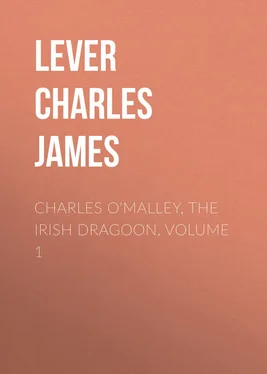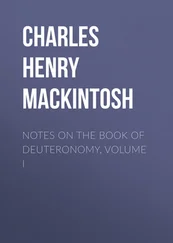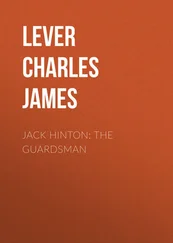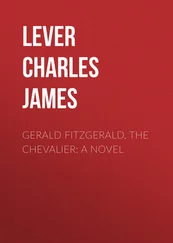Charles Lever - Charles O'Malley, The Irish Dragoon, Volume 1
Здесь есть возможность читать онлайн «Charles Lever - Charles O'Malley, The Irish Dragoon, Volume 1» — ознакомительный отрывок электронной книги совершенно бесплатно, а после прочтения отрывка купить полную версию. В некоторых случаях можно слушать аудио, скачать через торрент в формате fb2 и присутствует краткое содержание. Издательство: Иностранный паблик, Жанр: literature_19, foreign_antique, foreign_prose, на английском языке. Описание произведения, (предисловие) а так же отзывы посетителей доступны на портале библиотеки ЛибКат.
- Название:Charles O'Malley, The Irish Dragoon, Volume 1
- Автор:
- Издательство:Иностранный паблик
- Жанр:
- Год:неизвестен
- ISBN:нет данных
- Рейтинг книги:4 / 5. Голосов: 1
-
Избранное:Добавить в избранное
- Отзывы:
-
Ваша оценка:
- 80
- 1
- 2
- 3
- 4
- 5
Charles O'Malley, The Irish Dragoon, Volume 1: краткое содержание, описание и аннотация
Предлагаем к чтению аннотацию, описание, краткое содержание или предисловие (зависит от того, что написал сам автор книги «Charles O'Malley, The Irish Dragoon, Volume 1»). Если вы не нашли необходимую информацию о книге — напишите в комментариях, мы постараемся отыскать её.
Charles O'Malley, The Irish Dragoon, Volume 1 — читать онлайн ознакомительный отрывок
Ниже представлен текст книги, разбитый по страницам. Система сохранения места последней прочитанной страницы, позволяет с удобством читать онлайн бесплатно книгу «Charles O'Malley, The Irish Dragoon, Volume 1», без необходимости каждый раз заново искать на чём Вы остановились. Поставьте закладку, и сможете в любой момент перейти на страницу, на которой закончили чтение.
Интервал:
Закладка:
“Charles, sir,” said I, shutting the door carefully, and approaching his bedside. “Charles O’Malley, sir. I’m come to have a bit of your advice; and as the affair won’t keep, I have been obliged to disturb you.”
“Never mind, Charley,” said the count; “sit down, there’s a chair somewhere near the bed, – have you found it? There! Well now, what is it? What news of Blake?”
“Very bad; no worse. But it is not exactly that I came about; I’ve got into a scrape, sir.”
“Run off with one of the daughters,” said Considine. “By jingo, I knew what those artful devils would be after.”
“Not so bad as that,” said I, laughing. “It’s just a row, a kind of squabble; something that must come – ”
“Ay, ay,” said the count, brightening up; “say you so, Charley? Begad, the young ones will beat us all out of the field. Who is it with, – not old Blake himself; how was it? Tell me all.”
I immediately detailed the whole events of the preceding chapter, as well as his frequent interruptions would permit, and concluded by asking what farther step was now to be taken, as I was resolved the matter should be concluded before it came to my uncle’s ears.
“There you are all right; quite correct, my boy. But there are many points I should have wished otherwise in the conduct of the affair hitherto.”
Conceiving that he was displeased at my petulance and boldness, I was about to commence a kind of defence, when he added, —
“Because, you see,” said he, assuming an oracular tone of voice, “throwing a wine-glass, with or without wine, in a man’s face is merely, as you may observe, a mark of denial and displeasure at some observation he may have made, – not in any wise intended to injure him, further than in the wound to his honor at being so insulted, for which, of course, he must subsequently call you out. Whereas, Charley, in the present case, the view I take is different; the expression of Mr. Bodkin, as regards your uncle, was insulting to a degree, – gratuitously offensive, – and warranting a blow. Therefore, my boy, you should, under such circumstances, have preferred aiming at him with a decanter: a cut-glass decanter, well aimed and low, I have seen do effective service. However, as you remark it was your first thing of the kind, I am pleased with you – very much pleased with you. Now, then, for the next step.” So saying, he arose from his bed, and striking a light with a tinder-box, proceeded to dress himself as leisurely as if for a dinner party, talking all the while.
“I will just take Godfrey’s tax-cart and the roan mare on to Meelish, put them up at the little inn, – it is not above a mile from Bodkin’s; and I’ll go over and settle the thing for you. You must stay quiet till I come back, and not leave the house on any account. I’ve got a case of old broad barrels there that will answer you beautifully; if you were anything of a shot, I’d give you my own cross handles, but they’d only spoil your shooting.”
“I can hit a wine-glass in the stem at fifteen paces,” said I, rather nettled at the disparaging tone in which he spoke of my performance.
“I don’t care sixpence for that; the wine-glass had no pistol in his hand. Take the old German, then; see now, hold your pistol thus, – no finger on the guard there, these two on the trigger. They are not hair-triggers; drop the muzzle a bit; bend your elbow a trifle more; sight your man outside your arm, – outside, mind, – and take him in the hip, and if anywhere higher, no matter.”
By this time the count had completed his toilet, and taking the small mahogany box which contained his peace-makers under his arm, led the way towards the stables. When we reached the yard, the only person stirring there was a kind of half-witted boy, who, being about the house, was employed to run of messages from the servants, walk a stranger’s horse, or to do any of the many petty services that regular domestics contrive always to devolve upon some adopted subordinate. He was seated upon a stone step formerly used for mounting, and though the day was scarcely breaking, and the weather severe and piercing, the poor fellow was singing an Irish song, in a low monotonous tone, as he chafed a curb chain between his hands with some sand. As we came near he started up, and as he pulled off his cap to salute us, gave a sharp and piercing glance at the count, then at me, then once more upon my companion, from whom his eyes were turned to the brass-bound box beneath his arm, – when, as if seized with a sudden impulse, he started on his feet, and set off towards the house with the speed of a greyhound, not, however, before Considine’s practised eye had anticipated his plan; for throwing down the pistol-case, he dashed after him, and in an instant had seized him by the collar.
“It won’t do, Patsey,” said the count; “you can’t double on me.”
“Oh, Count, darlin’, Mister Considine avick, don’t do it, don’t now,” said the poor fellow, falling on his knees, and blubbering like an infant.
“Hold your tongue, you villain, or I’ll cut it out of your head,” said Considine.
“And so I will; but don’t do it, don’t for the love of – ”
“Don’t do what, you whimpering scoundrel? What does he think I’ll do?”
“Don’t I know very well what you’re after, what you’re always after too? Oh, wirra, wirra!” Here he wrung his hands, and swayed himself backwards and forwards, a true picture of Irish grief.
“I’ll stop his blubbering,” said Considine, opening the box and taking out a pistol, which he cocked leisurely, and pointed at the poor fellow’s head; “another syllable now, and I’ll scatter your brains upon that pavement.”
“And do, and divil thank you; sure, it’s your trade.”
The coolness of the reply threw us both off our guard so completely that we burst out into a hearty fit of laughing.
“Come, come,” said the count, at last, “this will never do; if he goes on this way, we’ll have the whole house about us. Come, then, harness the roan mare; and here’s half a crown for you.”
“I wouldn’t touch the best piece in your purse,” said the poor boy; “sure it’s blood-money, no less.”
The words were scarcely spoken, when Considine seized him by the collar with one hand, and by the wrist with the other, and carried him over the yard to the stable, where, kicking open the door, he threw him on a heap of stones, adding, “If you stir now, I’ll break every bone in your body;” a threat that seemed certainly considerably increased in its terrors, from the rough gripe he had already experienced, for the lad rolled himself up like a ball, and sobbed as if his heart were breaking.
Very few minutes sufficed us now to harness the mare in the tax-cart, and when all was ready, Considine seized the whip, and locking the stable-door upon Patsey, was about to get up, when a sudden thought struck him. “Charley,” said he, “that fellow will find some means to give the alarm; we must take him with us.” So saying, he opened the door, and taking the poor fellow by the collar, flung him at my feet in the tax-cart.
We had already lost some time, and the roan mare was put to her fastest speed to make up for it. Our pace became, accordingly, a sharp one; and as the road was bad, and the tax-cart no “patent inaudible,” neither of us spoke. To me this was a great relief. The events of the last few days had given them the semblance of years, and all the reflection I could muster was little enough to make anything out of the chaotic mass, – love, mischief, and misfortune, – in which I had been involved since my leaving O’Malley Castle.
“Here we are, Charley,” said Considine, drawing up short at the door of a little country ale-house, or, in Irish parlance, shebeen , which stood at the meeting of four bleak roads, in a wild and barren mountain tract beside the Shannon. “Here we are, my boy! Jump out and let us be stirring.”
Читать дальшеИнтервал:
Закладка:
Похожие книги на «Charles O'Malley, The Irish Dragoon, Volume 1»
Представляем Вашему вниманию похожие книги на «Charles O'Malley, The Irish Dragoon, Volume 1» списком для выбора. Мы отобрали схожую по названию и смыслу литературу в надежде предоставить читателям больше вариантов отыскать новые, интересные, ещё непрочитанные произведения.
Обсуждение, отзывы о книге «Charles O'Malley, The Irish Dragoon, Volume 1» и просто собственные мнения читателей. Оставьте ваши комментарии, напишите, что Вы думаете о произведении, его смысле или главных героях. Укажите что конкретно понравилось, а что нет, и почему Вы так считаете.












